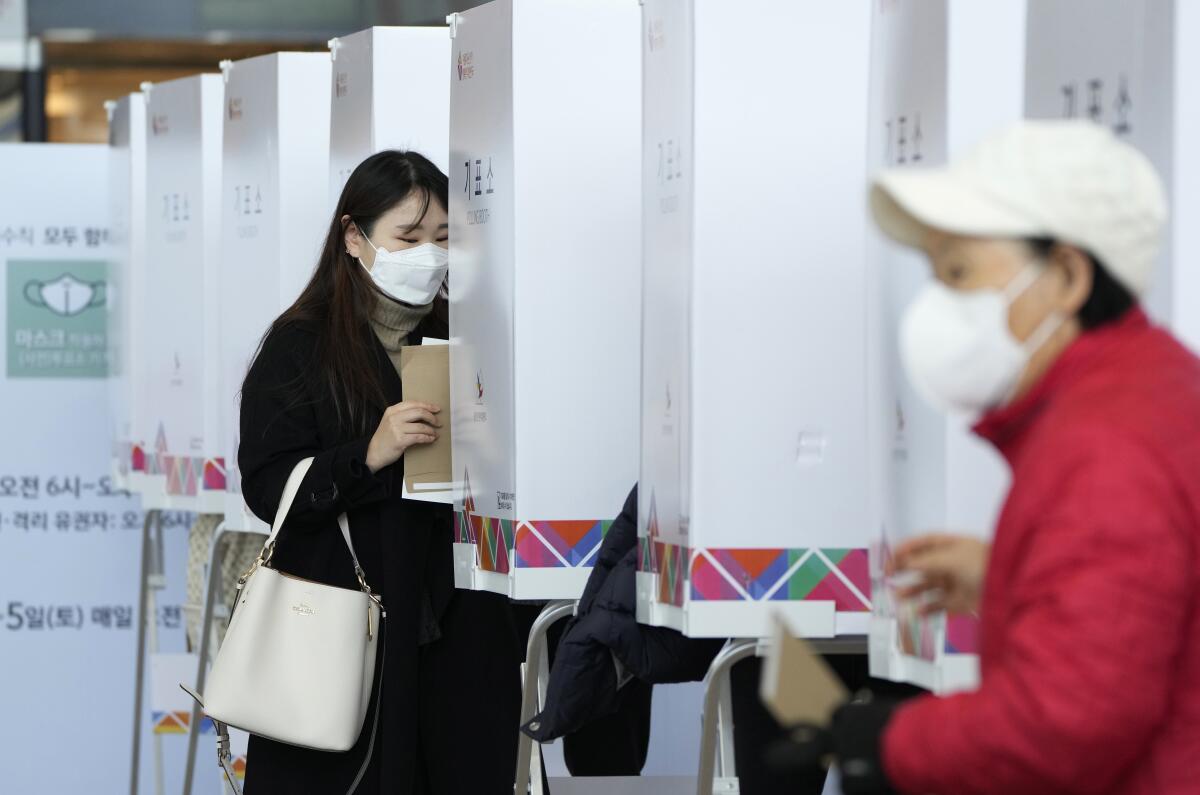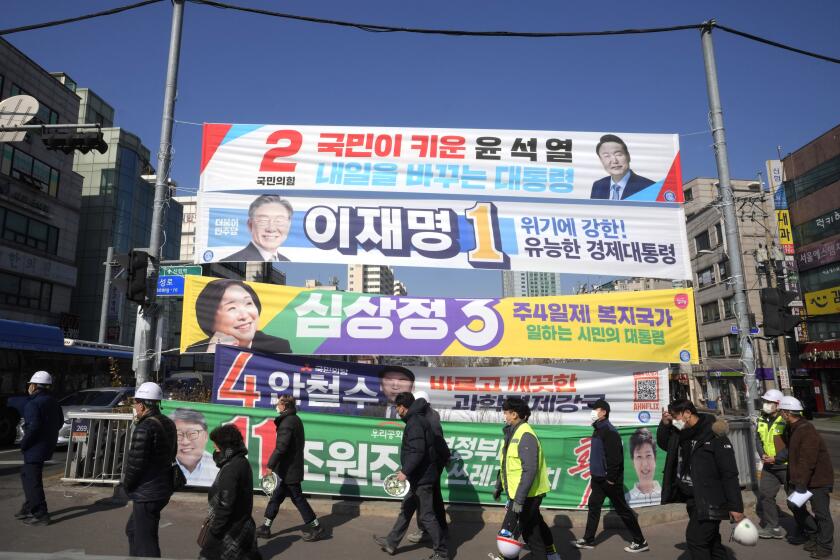What to know about South Korea’s presidential election Wednesday

- Share via
SEOUL — Whoever wins South Korea’s presidential election Wednesday will face a host of major issues, including skyrocketing housing prices, threats from nuclear-armed North Korea and a debate about how to heal a nation sharply split along ideological, generational and gender lines.
Here’s what to know about the election that will determine the leader of the world’s 10th-largest economy.
What’s at stake
The winner will take office on May 10 for a single five-year term. Current liberal President Moon Jae-in is barred by law from seeking reelection. The candidate who receives the most votes is declared the winner, even if that person fails to achieve majority support.
The present election system was adopted in 1987 when South Korea’s then military-backed government caved to massive pro-democracy protests and accepted sweeping liberalizing measures.
The mudslinging between South Korea’s two leading presidential candidates is so bad that the loser faces the possibility of jail time.
The candidates
The election has boiled down to a showdown between ruling liberal Democratic Party candidate, Lee Jae-myung, and his conservative opposition rival, Yoon Suk Yeol, from the People Power Party. Both have been criticized for negative campaigning and for not presenting long-term visions on how to lead South Korea.
Lee is a former governor of the populous Gyeonggi province that surrounds Seoul, while Yoon is a former prosecutor general who entered party politics last year.
Who can vote
About 44 million South Korean nationals age 18 or older are eligible to vote, out of the country’s population of about 52 million people. About 16 million of them already cast ballots during early voting last week.
Separately, about 161,820 voters who are living abroad also already cast ballots at polling booths established at South Korean diplomatic facilities. Tens of thousands of others on remote islands, at nursing homes or on ships have been voting by mail or fax.
On Wednesday, polling stations are open from 6 a.m. to 7:30 p.m.
South Korean presidential hopeful Lee Jae-myung says hair-loss treatments should be covered by national health insurance. He himself has a full mane.
Main issues
Lee and Yoon have been bickering over North Korea’s advancing nuclear arsenal and an intensifying U.S.-China rivalry.
Lee, who has often expressed nationalistic views, hopes to win exemptions from U.N. sanctions against North Korea to revive stalled inter-Korean economic cooperation projects. He also believes Seoul could act as a mediator between Washington and Pyongyang to revive dormant nuclear diplomacy.
Yoon says he would seek a stronger U.S. security commitment to deter North Korean aggression. He wants to launch preemptive strikes on the North if it displays signs of attack.
While Lee favors a balancing act between Washington and Beijing — Seoul’s chief security ally and its biggest trading partner, respectively — Yoon has made it clear that a boosted alliance with the United States would be the center of his foreign policy.
Both have promised to offer economic relief to small business owners hit by pandemic-related restrictions, provide millions of public housing units throughout the country, and create more jobs.
Scandals
The mudslinging between Lee and Yoon involves plenty of bizarre accusations targeting the candidates and their families.
Yoon’s wife was forced to apologize over suspicions that she falsified her work experience when applying for teaching jobs at colleges. Lee’s wife also apologized over allegations that she privately used official funds and made public servants do her personal errands while her husband served as a Gyeonggi governor.
Yoon has attacked Lee over allegations that Lee is a central figure in a corrupt property development project launched in the city of Seongnam when he was mayor there. Lee and his allies have tried to link Yoon to that scandal and also accused the opposition candidate and his wife of having depended on shamanism, an ancient religious belief, too much.
Virus fears
Wednesday’s vote will take place as coronavirus infections surge. Virus patients and others placed in quarantine are allowed to cast ballots when regular voting closes at 6 p.m. They are asked to vote at designated polling booths, while election workers will be equipped with gloves, masks, face screens and protective suits.
Arranging a voting process for virus carriers was crucial, with health authorities rapidly expanding at-home treatments to save hospital resources. As of Monday, more than 1.15 million people with mild or moderate symptoms were being asked to isolate at home.
More to Read
Sign up for Essential California
The most important California stories and recommendations in your inbox every morning.
You may occasionally receive promotional content from the Los Angeles Times.












